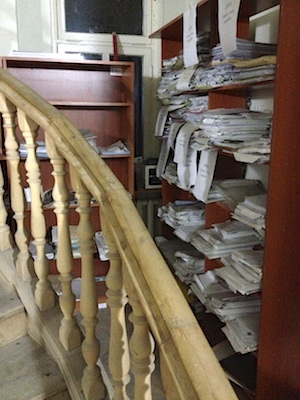 An aspiring government watchdog in Armenia faces an uphill battle. Weak safeguards against corruption and a government-dominated media have led to widespread distrust of elected officials and most news outlets. A recent Open Society Foundations report cites the country for "lack of independence of regulatory institutions, non-transparent media ownership," and a slow-developing media sector.
An aspiring government watchdog in Armenia faces an uphill battle. Weak safeguards against corruption and a government-dominated media have led to widespread distrust of elected officials and most news outlets. A recent Open Society Foundations report cites the country for "lack of independence of regulatory institutions, non-transparent media ownership," and a slow-developing media sector.
Levon Barseghyan, activist and founder of the Journalists Club Asparez, says mainstream media has so little credibility that Armenians watch state TV using "a vice versa approach."
Asparez (or "Arena") hosts one of the country's top 10 news web sites, Asparez.am. To foster public knowledge and government accountability, they are also tracking public funding to schools and regional governments, then posting and charting the results online at PublicData.am.
Yearly Archives 2014
The RightsCon summit presented by digital human rights champions Access, included an inspiring range of panels and panelists. I liveblogged a handful of sessions, including "Anonymity, Pseudonymity, and Freedom of Expression," which had an extraordinary concentration of brainpower. These notes are not perfect, but capture many of the smart and instructive points the group made. Colin Crowell, who leads on public policy at Twitter, led off by introducing all the session panelists. aestetix, co-founder of NymRights, is a policy advocate, technologist, speaker, and researcher working in the identity "ecosystem." Crowell praised Vince Sollitto from Yelp for his "sterling" communications policy background in business and the private sector. Vince began on Capitol Hill and also served as spokesman to under Governor Arnold Schwarzenegger. Eva Galperin from EFF stepped in for Karen Reilly of the Tor project, who was unable to join. Eva worked on the real name policies at Google+ and…
Cross-posted from the #TABridge blogWhen librarians speak out in protest, you know something serious is going on. That's what happened last month amid the public outcry after a U.S. appeals court supported telecom giant Verizon in its lawsuit against net neutrality regulations.The American Library Association said the ruling "if it stands ... will fundamentally change the open nature of the Internet, where uncensored access to information has been a hallmark of the communication medium since its inception."Net neutrality's underlying principle is that the speed, cost and availability of your Internet service cannot change based on which site you try to reach. On a neutral Internet, providers "treat all bits equally," Global Voices co-founder Ethan Zuckerman wrote in 2006.The court's January ruling said, in simplified terms, that the Federal Communications Commission was seeking to regulate cable companies and phone companies the same way, even though current regulations impose a clear distinction between the two groups. (Some pro-neutrality critics also…